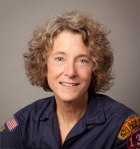Founder and Executive Director, National LGBT Cancer Network
As published on Huffington Post’s new LGBT Wellness blog, see original at: http://www.huffingtonpost.com/liz-margolies-lcsw/i-did-it-lunch-with-a-total-stranger_b_5090289.html
When a white, atheist psychotherapist has lunch with the founder of Depressed Black Gay Men (DBGM), they each get food for thought.
We met by email when someone forwarded his information to me. The email didn’t even contain a last name, but it was one of the most eloquently written requests for information about LGBT cultural competency trainings I had ever read. Over the course of that day, Antoine Craigwell and I corresponded several times about our respective organizations, but he always avoided answering my direct questions about himself, his profession, or how he came to write so well. Instead he asked to meet for a one-hour lunch the next day at a Cuban restaurant in my neighborhood. I requested a picture so that I would recognize him when he arrived; he sent me a selfie with an intense gaze.
I arrived on time. (Remember, I’m a psychotherapist.) He was 20 minutes late, meaning a full third of our time was already gone, but he vanquished my annoyance with an immediate apology and charm. We took the last two seats at the counter, and I ordered the only vegetarian options available: rice, beans and tostones. He got liver and onions over his rice and beans. I tried to find out more about his personal life, but again, he gently deflected those attempts, keeping our discussion fascinating but academic, until we gradually moved to the focus of his work.
Several years ago, after attending the funeral of a young, black gay man who had taken his own life, Antoine decided to write a book. He is not a mental health professional but noticed three things that can make the experience of depression different for many black gay men: religiously fueled homophobia, stigma, and intraracism. Through interviews and extensive research he discovered that in this population depression is expressed not only in typical ways but often in ways that may include violence, anger, drug use and unsafe sexual practices. We engaged in an intense conversation about racism in diagnoses and untreated depression. When the form of depression is unrecognized and therefore undiagnosed, it is also left untreated. In fact, most studies report far lower rates of depression and mood disorders among blacks and Latinos than among whites. And yet, just as Antoine said, LGB youth who are also members of racial/ethnic minorities have a significantly increased risk of suicide attempts. Clearly, the measurement tools for diagnosing depression are inadequate for recognizing depression in many black gay men. In one report that I found after that lunch, 43 percent of black gay youth reported having thought about or attempted suicide as a result of issues related to their sexual orientation.
Antoine explained to me that the black church is the bedrock of many families and the community, but that in spite of offering invaluable systems for coping with sociocultural stressors, it often espouses a fundamentalist perspective on sexuality, causing some mothers to cast their sons out of families, sometimes for even a hint of homosexuality. The results are often disastrous. As an atheist mother of a queer son, my heart twisted in despair: I don’t think about religion very much, so I was struck by how support and condemnation contradict each other yet are so closely intertwined.
Feeling an urgency to reach more people than books can, Antoine switched directions, producing the documentary You Are Not Alone and founding DBGM, a nonprofit organization with a mission to raise awareness and save lives. “If by what I’m doing, one black gay man could be prevented from killing himself, then my job is done; his healing begins,” he said. Antoine has been showing the documentary around the country. It features powerful interviews with black gay men, religious leaders (Christian and Islamic) and mental health professionals.
According to Antoine, DBGM will soon launch a program entitled “I Am Working on Healing,” with two support groups: “Sons and Mothers” for black gay boys and their mothers, to encourage acceptance of their gay sons, and “My Sons” for black mothers whose sons have committed suicide. Antoine also offers cultural competency trainings wherever possible. “Aha!” I thought. “This may be where our work together begins.”
After lunch I thought about my own social activism, which is primarily focused oncancer, a disease that usually strikes later in life. I then thought about the young black gay men who would never reach adulthood and whose untreated and undiagnosed depression would mean that they would also never likely reach a psychotherapist’s office. I thought about how a good psychotherapist had saved my own son’s life and realized how fortunate we both are that he did. The 40-minute lunch shook me.
When I returned home, I Googled Antoine’s name and learned that my humble lunch-mate is an award-winning journalist. He is also, surely, a powerful agent for change.
To learn more about DBGM, visit their website.
Need help? Visit The Trevor Project or call them at 1-866-488-7386. You can also call 1-800-273-8255 for the National Suicide Prevention Lifeline.
Follow Liz Margolies, L.C.S.W. on Twitter: www.twitter.com/cancerlgbt



Leave a comment